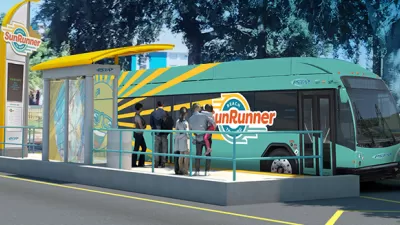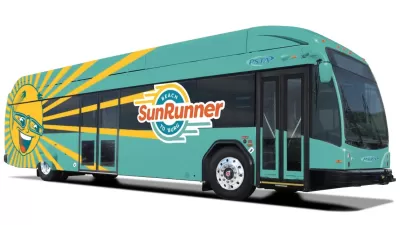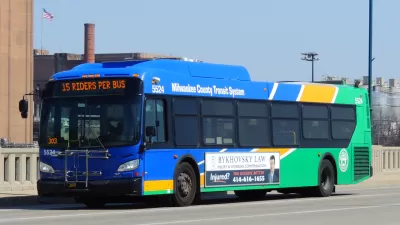The transit agency’s board voted to use all-electric buses in its planned bus rapid transit fleet, but criticism of plans to expand a freeway to accommodate the new route remain.

As reported by C.T. Bowen, “The governing board of the Tampa Bay Regional Transit Authority, known commonly by the acronym TBARTA, agreed Friday to use electric buses on the proposed transit system that is not expected to be operational until 2030.”
In prior plans, “The 41-mile route posed a challenge to running buses without a way to recharge while in service. The board agreed to a plan to install 11 charging stations at eight locations in addition to the 15 chargers needed at the overnight depot.” As Sen notes, “The earlier plan to use hybrid buses entailed 22 vehicles to run the four planned routes from State Road 54 in Pasco County to downtown Tampa and on to the city of St. Petersburg.”
Now, the agency has agreed to make all 29 buses electric. “The upfront spending on more expensive electric vehicles and charging stations will have other benefits. Calculations, compiled by a federal Transit Agency matrix, put annual environmental savings at $568,000 per electric bus, including better safety, reduced energy use and air quality benefits.”
While the agency is pushing ahead with plans to build the BRT route, “Opposition to the regional transit plan remains in Hillsborough County because of public reluctance to add additional lanes to Interstate 275 to accommodate the buses and added vehicle traffic.”
FULL STORY: Tampa Bay transit agency opts for all-electric buses on regional route

Alabama: Trump Terminates Settlements for Black Communities Harmed By Raw Sewage
Trump deemed the landmark civil rights agreement “illegal DEI and environmental justice policy.”

Planetizen Federal Action Tracker
A weekly monitor of how Trump’s orders and actions are impacting planners and planning in America.

The 120 Year Old Tiny Home Villages That Sheltered San Francisco’s Earthquake Refugees
More than a century ago, San Francisco mobilized to house thousands of residents displaced by the 1906 earthquake. Could their strategy offer a model for the present?

In Both Crashes and Crime, Public Transportation is Far Safer than Driving
Contrary to popular assumptions, public transportation has far lower crash and crime rates than automobile travel. For safer communities, improve and encourage transit travel.

Report: Zoning Reforms Should Complement Nashville’s Ambitious Transit Plan
Without reform, restrictive zoning codes will limit the impact of the city’s planned transit expansion and could exclude some of the residents who depend on transit the most.

Judge Orders Release of Frozen IRA, IIJA Funding
The decision is a victory for environmental groups who charged that freezing funds for critical infrastructure and disaster response programs caused “real and irreparable harm” to communities.
Urban Design for Planners 1: Software Tools
This six-course series explores essential urban design concepts using open source software and equips planners with the tools they need to participate fully in the urban design process.
Planning for Universal Design
Learn the tools for implementing Universal Design in planning regulations.
Clanton & Associates, Inc.
Jessamine County Fiscal Court
Institute for Housing and Urban Development Studies (IHS)
City of Grandview
Harvard GSD Executive Education
Toledo-Lucas County Plan Commissions
Salt Lake City
NYU Wagner Graduate School of Public Service





























